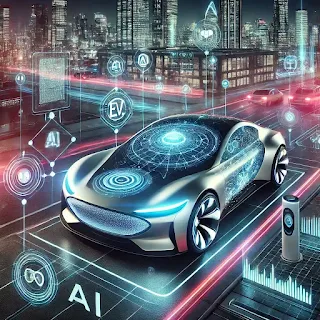The Future of Electric Cars: How AI is Revolutionizing the EV Industry
Electric vehicles (EVs) have rapidly evolved over the past decade, and now, artificial intelligence (AI) is playing a crucial role in shaping their future. With advancements in machine learning, automation, and real-time data analysis, AI is transforming how EVs operate, how they interact with drivers, and how the overall industry functions.
From autonomous driving to smart battery management, AI is pushing the boundaries of what electric cars can achieve. This article explores how AI is revolutionizing the EV industry and what we can expect in the coming years.
AI-Powered Autonomous Driving
One of the biggest AI-driven transformations in the EV industry is autonomous driving. Companies like Tesla, Waymo, and General Motors are developing self-driving technologies that rely on AI to navigate roads, avoid obstacles, and ensure passenger safety.
How AI Improves Self-Driving Cars
- Machine Learning Algorithms – AI continuously learns from real-world driving data, improving decision-making over time.
- Computer Vision – AI-powered cameras and sensors detect pedestrians, vehicles, and road signs.
- Predictive Analytics – AI anticipates potential hazards, reducing accidents.
Current Developments in Self-Driving EVs
- Tesla’s Full Self-Driving (FSD) – Uses AI to enable hands-free driving in urban and highway environments.
- Waymo’s Robotaxis – Google’s Waymo is using AI-powered EVs for ride-hailing services.
- Mercedes-Benz Drive Pilot – The first AI-based Level 3 autonomous system approved in Europe.
While fully autonomous EVs are still in development, AI is already making driving safer and more efficient.
AI-Enhanced Battery Management
One of the biggest challenges in the EV industry is battery efficiency and lifespan. AI is now helping optimize battery performance, making electric cars more reliable and long-lasting.
How AI Improves EV Batteries
- Smart Charging Systems – AI predicts the best times to charge based on energy costs and grid demand.
- Battery Health Monitoring – AI tracks battery usage and suggests maintenance to prevent degradation.
- Regenerative Braking Optimization – AI maximizes energy recovery while driving, extending battery life.
AI-Powered Battery Innovations
- Tesla’s Battery Day AI Models – Tesla uses AI to analyze battery chemistry and improve range.
- Toyota’s Solid-State Batteries – AI helps in the research of next-gen, ultra-fast charging batteries.
- AI-Driven Battery Recycling – AI assists in identifying reusable battery materials, reducing waste.
By leveraging AI, EV manufacturers are making batteries more efficient, sustainable, and cost-effective.
AI in EV Charging Infrastructure
Charging networks are a key component of EV adoption. AI is playing a crucial role in improving charging station availability, speed, and efficiency.
How AI is Revolutionizing EV Charging
- Smart Grid Integration – AI helps balance power loads by distributing electricity based on demand.
- Predictive Maintenance – AI detects potential charger malfunctions before they cause failures.
- Dynamic Pricing – AI adjusts charging costs based on electricity demand and supply.
Leading AI-Powered EV Charging Solutions
- Tesla Superchargers – AI optimizes charging speed and reduces waiting times.
- ChargePoint AI System – Uses machine learning to predict user demand and optimize station placement.
- EVgo’s Smart Charging Algorithms – AI enhances fast-charging efficiency while reducing energy waste.
By using AI in charging networks, EV drivers experience faster, smarter, and more reliable charging options.
AI-Driven Personalization & In-Car Experience
Modern EVs are integrating AI to offer personalized driving experiences. From AI-powered assistants to adaptive driving settings, EVs are becoming more intuitive and user-friendly.
AI-Powered Features in EVs
- Voice Assistants – AI-driven assistants like Tesla’s voice control and Apple CarPlay AI enhance driver interaction.
- Personalized Driving Modes – AI learns user habits and adjusts seat position, climate control, and music preferences.
- Safety Enhancements – AI detects driver fatigue and alerts them when needed.
Companies Leading AI Personalization in EVs
- Lucid Motors – Uses AI for predictive maintenance and driving behavior analysis.
- NIO’s NOMI AI Assistant – An interactive AI that learns driver preferences.
- Rivian’s AI Navigation – Provides smart route suggestions based on charging stations and traffic.
AI is transforming EVs into intelligent, highly customizable vehicles that enhance user comfort and convenience.
The Future of AI in the EV Industry
The integration of AI in electric vehicles is only getting started. Here’s what we can expect in the near future:
1. AI-Enhanced Vehicle-to-Grid (V2G) Technology
EVs will soon be able to send excess energy back to the grid, reducing electricity costs and supporting renewable energy sources.
2. AI-Powered Traffic Management
Self-driving AI will communicate with smart city infrastructure to optimize traffic flow, reducing congestion and emissions.
3. Predictive AI for EV Maintenance
AI will predict mechanical failures before they happen, minimizing costly repairs and downtime.
4. Full Automation in EV Manufacturing
AI-driven robots will handle complex EV assembly processes, making production faster and more efficient.
5. AI-Based Road Safety Enhancements
Real-time AI analysis will prevent collisions, detect road hazards, and improve pedestrian safety.
Final Thoughts
AI is revolutionizing the EV industry by improving autonomous driving, battery performance, charging infrastructure, and in-car experiences. As technology advances, AI will play an even bigger role in making EVs safer, more efficient, and more accessible to the masses.
With companies like Tesla, Rivian, and Lucid Motors leading the charge, the future of electric cars looks smarter than ever.
🚗 What do you think about AI in EVs? Will it make electric cars even better? Let us know in the comments!















0 Comments